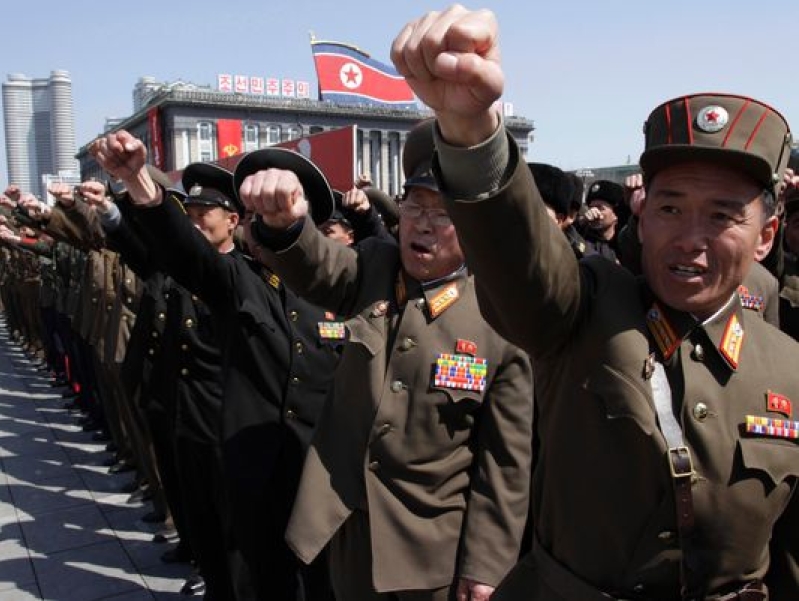
In a latest war cry against America, North Korea’s military threatened that it has been authorized to attack the U.S. using “smaller, lighter and diversified” nuclear weapons and warned, “The moment of explosion is approaching fast.”
“No one can say a war will break out in Korea or not and whether it will break out today or tomorrow,” North Korea’s state news agency KCNA declared in its latest broadcast, according to CNN. “The responsibility for this grave situation entirely rests with the U.S. administration and military warmongers keen to encroach upon the DPRK’s sovereignty and bring down its dignified social system with brigandish logic.”
The new threat came after the North Korea locked South Korean workers out of a joint factory complex and announced plans to start a nuclear reactor it destroyed five years ago.
Hours after this threat, South Korea’s defense minister reported that North Korea has moved a missile with “considerable range” to its east coast.
South Korea Defense Minister Kim Kwan-jin said he does not know the reasons behind North’s missile movement, and that it “could be for testing or drills.” He also said that there are no signs that Pyongyang is preparing for a full-scale conflict.
According to CBC, Kim said if North Korea were preparing for a full-scale war, there would be signs including the mobilization of a number of units, including supply and rear troops, but South Korean military officials have no such preparations.
Despite reports of the missile’s “considerable range”, Kim told lawmakers at a parliamentary committee meeting that the missile is not capable of hitting U.S. mainland.
The Pentagon announced that it will deploy a missile defense system to the U.S. Pacific territory of Guam, a Pacific territory that’s home to U.S. naval and airbases, to strengthen regional protection against attack. Earlier this week, the U.S. military showed its commitment to defend its allies in Northeast Asia by flying a B-2 stealth bombers capable of carrying conventional or nuclear weapons, Cold War-era B-52s and F-22 Raptor stealth fighters over South Korea.
According to CNN, James Hardy, Asia Pacific editor of HIS Jane’s Defense Weekly, wrote in a recent analysis, “From what we know of its existing inventory, North Korea has short- and medium-range missiles that could complicate a situation on the Korean Peninsula (and perhaps reach Japan), but we have not seen any evidence that it has long-range missiles that could strike the continental U.S., Guam or Hawaii.”
Pyongyang’s recent rhetorical threats are caused by joint U.S. and South Korean military exercises taking place in South Korea and tightened UN sanctions for its February nuclear test.
Most experts say the threats are probably efforts to provoke softer policies from South Korea, to win diplomatic talks with Washington and to solidify the authority of young North Korean leader Kim Jong-un.
U.S. Defense Secretary Chuck Hagel said Wednesday that the North Korean threats to Guam, Hawaii and the U.S. mainland have to be taken seriously.
“It only takes being wrong once, and I don’t want to be the secretary of defense who was wrong once,” he said. It is known that the North Korea military have a stockpile of conventional military firepower, including medium-range ballistic missiles that can carry high explosives for hundreds of miles.
But Hagel also said there was still a "responsible" path for the North to take.
"I hope the North will ratchet this very dangerous rhetoric down," Hagel said. "There is a pathway that is responsible for the North to get on a path to peace working with their neighbors. There are many, many benefits to their people that could come. But they have got to be a responsible member of the world community, and you don't achieve that responsibility and peace and prosperity by making nuclear threats and taking very provocative actions."






